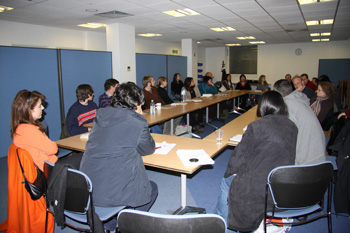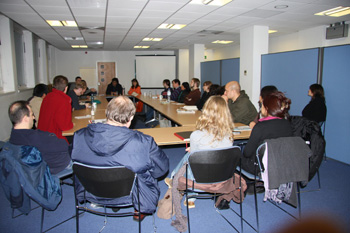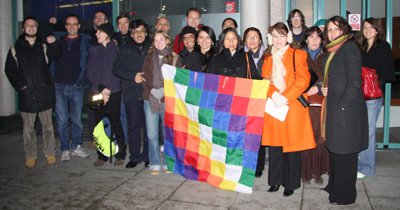Bolivia's threat of civil war
- 13 December 2007
 (Morning Star , Friday December 14 2007)
(Morning Star , Friday December 14 2007)Bolivian opposition tactics could split the country, writes Charley Allan.
BOLIVIAN ambassador for trade and integration Pablo Solon issued a stark warning to solidarity campaigners on Wednesday night that his country "stands at the door to civil war."
Speaking at the National Union of Journalists headquarters in London during a tour of European capitals, he added that the situation was "critical" as four state governors opposed to President Evo Morales have announced that they are declaring regional autonomy from Saturday.
"We're not against autonomy, autonomy is good, but there must be limits. We can't have two armies in one country or two foreign policies or two currencies," Mr Solon insisted.
Explaining the background to the conflict, he pointed out that, "when Evo Morales was elected, there were several demands, including the nationalisation of gas and oil and an end to water privatisation.
 "But another demand was for a constitutional assembly to write a new constitution because the present one doesn't recognise the rights of the indigenous population, who make up the majority."
"But another demand was for a constitutional assembly to write a new constitution because the present one doesn't recognise the rights of the indigenous population, who make up the majority."However, this assembly was effectively "kidnapped" by right-wing politicians who would only discuss moving the parliamentary capital to the city of Sucre, near the resource-rich eastern region of Santa Cruz, according to Mr Solon, who added that this idea would be simply "impossible" - if only because of the massive expense involved.
Santa Cruz is spearheading a separatist movement that is threatening to "split the nation."
Last Sunday, the assembly approved a final text, which will now be voted on in a national referendum.
As well as attempting to "blockade" this process, the opposition is also organising acts of violence, with small groups of "fascist youth" attacking the social movements and the police, facilitating prison break-outs and even burning down houses of pro-government governors.
Mr Solon explained that their objective is to "provoke violence by the state so that Evo Morales would be seen as a dictator."
 However, the president seems to have outmanoeuvred his enemies by calling for a recall referendum against himself and the governors of all nine states, "so that the people of Bolivia can choose."
However, the president seems to have outmanoeuvred his enemies by calling for a recall referendum against himself and the governors of all nine states, "so that the people of Bolivia can choose."Bolivian ambassador to London Maria Beatriz Souviron revealed that the British Foreign Office had recently organised a meeting in Parliament with opponents of President Morales, even introducing them to journalists.
"The opposition will try to stop us any way they can, by manipulating the media, telling lies, even kidnapping and beating people," she stormed.
Mr Solon explained that the reason for his visit was to raise awareness and support among parliamentarians, trade unionists and grass-roots activists.
Left Labour MP Jeremy Corbyn tabled an early day motion on Wednesday which declared "strong support for the Morales government" as well as "rejecting all attempts to violate the government's stability."
Wrapping up, Bolivia Solidarity Campaign spokeswoman Amancay Colque announced that this Sunday is the European day of action for Bolivia, with a rally taking place in Trafalgar Square featuring speeches alongside traditional music and dancing.